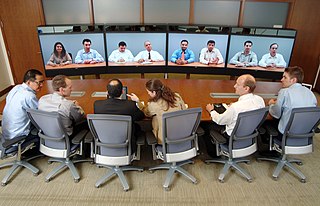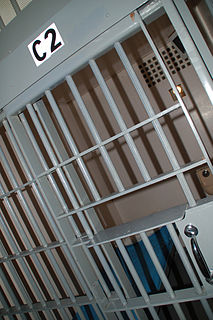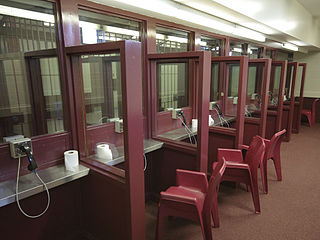Telephony is the field of technology involving the development, application, and deployment of telecommunication services for the purpose of electronic transmission of voice, fax, or data, between distant parties. The history of telephony is intimately linked to the invention and development of the telephone.
Lithgow Correctional Centre is a prison near Lithgow, Australia, operated by Corrective Services NSW, an agency of the New South Wales state government. The prison houses sentenced male inmates with a maximum security classification.

The Silverwater Correctional Complex, an Australian maximum and minimum security prison complex for males and females, is located in Silverwater, 21 kilometres (13 mi) west of the Sydney central business district in New South Wales, Australia. The complex is operated by Corrective Services NSW, an agency of the Department of Attorney General and Justice, of the Government of New South Wales.
A conjugal visit is a scheduled period in which an inmate of a prison or jail is permitted to spend several hours or days in private with a visitor, usually their legal spouse. The parties may engage in sexual activity. The generally recognized basis for permitting such visits in modern times is to preserve family bonds and increase the chances of success for a prisoner's eventual return to ordinary life after release from prison. They also provide an incentive to inmates to comply with the various day-to-day rules and regulations of the prison.

Videotelephony comprises the technologies for the reception and transmission of audio-video signals by users at different locations, for communication between people in real-time. A videophone is a telephone with a video display, capable of simultaneous video and audio for communication between people in real-time. Videoconferencing implies the use of this technology for a group or organizational meeting rather than for individuals, in a videoconference. Telepresence may refer either to a high-quality videotelephony system or to meetup technology, which goes beyond video into robotics. Videoconferencing has also been called "visual collaboration" and is a type of groupware.
Telerehabilitation is the delivery of rehabilitation services over telecommunication networks and the internet. Most types of services fall into two categories: clinical assessment, and clinical therapy. Some fields of rehabilitation practice that have explored telerehabilitation are: neuropsychology, speech-language pathology, audiology, occupational therapy, and physical therapy. Telerehabilitation can deliver therapy to people who cannot travel to a clinic because the patient has a disability or because of travel time. Telerehabilitation also allows experts in rehabilitation to engage in a clinical consultation at a distance.

The New York State Department of Corrections and Community Supervision (NYSDOCCS), is the department of the New York State government responsible for the care, confinement, and rehabilitation of inmates.

Lansing Correctional Facility (LCF) is a state prison operated by the Kansas Department of Corrections. LCF is located in Lansing, Kansas, in Leavenworth County. LCF, along with the Federal Bureau of Prison's United States Penitentiary, Leavenworth, the United States Army Corrections Command's United States Disciplinary Barracks, and Midwest Joint Regional Correctional Facility in Fort Leavenworth are the four major prisons that give the Leavenworth area its reputation as a corrections center.

The Texas Department of Criminal Justice (TDCJ) is a department of the government of the U.S. state of Texas. The TDCJ is responsible for statewide criminal justice for adult offenders, including managing offenders in state prisons, state jails, and private correctional facilities, funding and certain oversight of community supervision, and supervision of offenders released from prison on parole or mandatory supervision. The TDCJ operates the largest prison system in the United States.

The Pinellas County Sheriff's Office (PCSO) is the primary law enforcement agency for Pinellas County, Florida, United States and is responsible for law enforcement services in the unincorporated areas of the county as well as contract cities, jail facilities and courthouse security for Florida's 6th Judicial Circuit.
An inmate telephone system, also known as an Inmate Calling Service (ICS) or Inmate telephone service, is telephone service intended for use by inmates in correctional facilities in the United States. Telephone service for inmates allows for their rehabilitation by allowing consistent communication with their family and legal counsel while incarcerated.

Lesbian, gay, bisexual, and transgender (LGBT) prisoners often face additional challenges compared to non-LGBT prisoners. According to Just Detention International, LGBT inmates are "among the most vulnerable in the prison population". 67% of LGBT prisoners in California report being assaulted while in prison. The vulnerability of LGBT prisoners has led some prisons to separate them from other prisoners, while in others they are housed with the general population.

With approximately 18,000 employees, the Los Angeles County Sheriff's Department, officially the County of Los Angeles Sheriff's Department, is the nation's largest sheriff's department. The department's three main responsibilities entail providing patrol services for 153 unincorporated communities of Los Angeles County, California and 42 cities, providing courthouse security for the Superior Court of Los Angeles County, and the housing and transportation of inmates within the county jail system. In addition, the department contracts with the Los Angeles Metropolitan Transportation Authority and Metrolink, provides law enforcement services to ten community colleges, patrols over 177 county parks, golf courses, special event venues, two major lakes, 16 hospitals, and over 300 county facilities; and provides services, such as crime laboratories, homicide investigations, and academy training, to smaller law enforcement agencies within the county.
In most prisons, inmates are forbidden from possessing mobile phones due to their ability to communicate with the outside world and other security issues. Mobile phones are one of the most smuggled items into prisons. They provide inmates the ability to make and receive unauthorized phone calls, send email and text messages, use social media, and follow news pertaining to their case, among other forbidden uses.
Internet use in prisons allows inmates to communicate with the outside. Much like the use of telephones in prisons, the use of the internet under supervision, for various purposes, is approved in 49 U.S. correctional systems and five Canadian provinces. Each of the reporting U.S. systems, except Hawaii, Iowa, Nebraska and Nevada, use computers to employ inmate educational programs, as do all five reporting provinces in Canada. There are 36 reporting U.S. systems to handle inmate health issues via telemedicine. However much like the use of mobile phones in prison, internet access without supervision, via a smartphone, is banned for all inmates.
Infectious diseases within American correctional settings are a concern within the public health sector. The corrections population is susceptible to infectious diseases through, exposure to blood and other bodily fluids, drug injection, poor health care, prison overcrowding, demographics, security issues, lack of community support for rehabilitation programs, and high-risk behaviors. The spread of infectious diseases, such as HIV/AIDS and other sexually transmitted diseases, hepatitis C (HCV), hepatitis B (HBV), and tuberculosis result largely from needle-sharing, drug use, and consensual and nonconsensual sex among prisoners. HIV/AIDS and hepatitis C need specific attention because of the specific public health concerns and issues they raise.
JPay is a privately held corrections-related service provider based in the United States with its headquarters in Miramar, Florida. The company contracts with state Departments of Correction (DOC), county jails, and private federal prisons to provide technologies and services including money transfer, email, video visitation and parole and probation payments to approximately 1.5 million inmates throughout 35 states.

Incarcerated individuals' relationships are the familial and romantic relations of individuals in prisons or jails. Although the population of incarcerated men and women continues to increase, there is little research on the effects of incarceration on inmates' social worlds. However, it has been demonstrated that inmate's relationships play a seminal role in their well-being both during and after incarceration, making such research important in improving their overall health, and lowering rates of recidivism.

Securus Technologies is a United States-based prison technology company. It was founded in 1986 and is headquartered in Dallas, Texas with regional offices located in Carrollton, Texas, Allen, Texas and Atlanta, Georgia. The company employs approximately 1,000 people and is reported to have contracts with 2,600 correctional facilities in the United States. Securus announced in July 2016 that it had invested more than $600 million in technologies, patents and acquisitions in three years.












